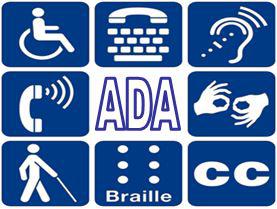LC Interpreting Services is now SignNexus!
Why Interpreter Visibility Matters
 Finally— more than 25 years after the Americans with Disabilities Act was passed to help guarantee basic access in public spaces for people who are disabled— businesses and organizations have started to realize that providing sign language interpreters upon request is not only the right thing to do, but it is actually the law. While this is certainly a step in the right direction, it still leaves us a long way from equality. Unlike those who can hear, individuals who are deaf continue to shoulder the burden of planning in advance and then requesting accommodations if they wish to do anything as simple as attending a concert or lecture.
Finally— more than 25 years after the Americans with Disabilities Act was passed to help guarantee basic access in public spaces for people who are disabled— businesses and organizations have started to realize that providing sign language interpreters upon request is not only the right thing to do, but it is actually the law. While this is certainly a step in the right direction, it still leaves us a long way from equality. Unlike those who can hear, individuals who are deaf continue to shoulder the burden of planning in advance and then requesting accommodations if they wish to do anything as simple as attending a concert or lecture.
Lately, however, I am seeing an interesting and promising trend. Working in the field, I have noticed some organizations booking ASL interpreting services for events without knowing for sure whether there would be a deaf attendee. This type of cultural awareness is pivotal.
 When organizations make the decision to consistently offer communication access (without being asked), the impact is two-fold. On one hand, they are creating an environment where access is a priority, which will naturally foster greater diversity among patrons. On the other hand, they are providing a model of inclusion that all attendees will recall moving forward. Just think about how those videos of ASL interpreters at music festivals tend to go viral— this is, in part, because equal access at musical events has been so rare that it is worth noting when it happens. People, both deaf and hearing, remember the awesome ASL interpreter.
When organizations make the decision to consistently offer communication access (without being asked), the impact is two-fold. On one hand, they are creating an environment where access is a priority, which will naturally foster greater diversity among patrons. On the other hand, they are providing a model of inclusion that all attendees will recall moving forward. Just think about how those videos of ASL interpreters at music festivals tend to go viral— this is, in part, because equal access at musical events has been so rare that it is worth noting when it happens. People, both deaf and hearing, remember the awesome ASL interpreter.
Access should be provided everywhere from museums, to Q&A sessions with authors, to comedy clubs and sporting events. We should see interpreters on screen during political speeches and on daytime television talk shows. Top tier performing artists could use just a small fraction of their touring budget to hire interpreters for every show, as a way to show recognition and appreciation for Deaf fans. The more hearing people see interpreters at work, the more they will begin to understand that people who are deaf exist around them at all times, and that deaf people have the right to participate in society on an equal level.
 For events themed around diversity or the empowerment of minority groups, it is especially important to ensure communication access is provided. When d/Deaf/HoH individuals attend these types of events and there is no interpreter or captioning available, it can cause doubt about the sincerity of the “inclusive” message of these movements. Inclusion means everyone can participate. The d/Deaf community has long been championing for civil rights in America, so communication access between deaf and hearing individuals can truly benefit an activist cause.
For events themed around diversity or the empowerment of minority groups, it is especially important to ensure communication access is provided. When d/Deaf/HoH individuals attend these types of events and there is no interpreter or captioning available, it can cause doubt about the sincerity of the “inclusive” message of these movements. Inclusion means everyone can participate. The d/Deaf community has long been championing for civil rights in America, so communication access between deaf and hearing individuals can truly benefit an activist cause.
Accessibility ought to be considered a basic cost of doing business. According to the 2010 US Census data, about 19% of Americans report having a disability of some type. This is approximately 1 in 5 individuals. At the end of the day, if a building has provided a wheelchair ramp and/or braille signage, or any other disability accommodations, then the entities providing services within the building should also be prepared to offer sign language interpreters on an as-needed basis. This can be as simple as establishing a service agreement with a local interpreting agency, so ASL interpreters can easily be requested at any time. It is the law, but most importantly: is the right thing to do. When organizing an event that is open to the public, take a moment to consider how multicultural our modern society is, and plan accordingly.

Awareness is created when people, both deaf and hearing, see ASL interpreters being provided on a consistent basis. If it were common to see interpreters at work, people would cease to view communication access as a novelty, and come to understand it as a necessity. This shift is happening slowly, as people who are d/Deaf are tired of being marginalized and silenced, pushed to the fringes of society. Businesses and organizations can either be ahead of this progressive turn, or they can get left behind still struggling to understand concepts like cultural competency and diversity in 2017.







